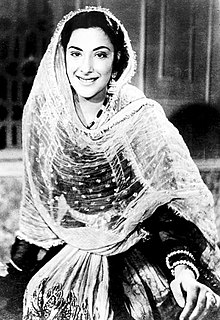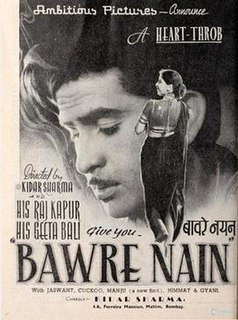
This article contains a list of books about Hindi film director and actor Raj Kapoor.

This article contains a list of books about Hindi film director and actor Raj Kapoor.
Khwaja Ahmad Abbas, also known as K. A. Abbas, was an Indian film director, screenwriter, novelist, and a journalist in the Urdu, Hindi and English languages. He won four National Film Awards in India, and internationally his films won the Palme d'Or at the Cannes Film Festival and the Crystal Globe at the Karlovy Vary International Film Festival. As a director and screenwriter, Khwaja Ahmad Abbas is considered one of the pioneers of Indian parallel or neo-realistic cinema, and as a screenwriter he is also known for writing Raj Kapoor's best films.

Shashi Kapoor was an Indian actor and film producer who is best known for his work in Hindi films. Recipient of several accolades, including four National Film Awards and two Filmfare Awards, he also featured in a number of English-language international films, particularly films produced by Merchant Ivory. The Government of India honoured him with the prestigious Padma Bhushan in 2011, and the Dadasaheb Phalke Award, in 2014, for his contribution to cinema.

Raj Kapoor, also known as Ranbir Raj Kapoor, was an Indian film actor, film producer and film director in the Indian cinema industry. He is widely considered as the greatest showman in the history of Indian cinema and entertainment. He received multiple accolades, including three National Film Awards and 11 Filmfare Awards in India. The Filmfare Lifetime Achievement Award is named after Kapoor. He was a two-time nominee for the Palme d'Or grand prize at the Cannes Film Festival for his films Awaara (1951) and Boot Polish (1954). His performance in Awaara was ranked as one of the top ten greatest performances of all time by Time magazine. His films attracted worldwide audiences, particularly in Asia and Europe.

Nargis Dutt was an Indian film actress, who starred in classic films of Bollywood. Regarded as one of the greatest actresses in the history of Indian cinema, she made her screen debut in a minor role at the age of 5 with Talash-E-Haq (1935), but her acting career actually began with the film Tamanna (1942).

The Filmfare Best Director Award is one of the main awards presented given by the annual Filmfare Awards to recognise directors working in the Hindi film Industry. It was first presented in 1954 in the inaugural year.

Javed Akhtar is an Indian political activist, poet, lyricist and screenwriter. He is originally from the Gwalior area. He is a recipient of the Padma Shri (1999), Padma Bhushan (2007), the Sahitya Akademi Award as well as five National Film Awards. In the early part of his career, he was a screenplay writer, creating films such as Deewar, Zanjeer and Sholay. Later, he left screenplay-writing and became a lyricist and social-political activist. He also remained a member of Rajya Sabha. In 2020, he received the Richard Dawkins Award for his contribution to secularism, free thinking, for critical thinking, holding religious dogma up to scrutiny, advancing human progress and humanist values. Javed Akhtar was chosen as a recipient for the Richard Dawkins Award for being "the bright light for reason, freethought, and atheism in a dark time".

Prithviraj Kapoor was a pioneer of Indian theatre and of the Hindi film industry, who started his career as an actor in the silent era of Hindi cinema, associated with IPTA as one of its founding members and who founded the Prithvi Theatres, a travelling theatre company based in Mumbai, in 1944. He was the patriarch of the Kapoor family of Hindi films, four generations of which, beginning with him, have played active roles in the Hindi film industry, with two generations still active in Bollywood. He's also acted in a Kannada movie Sākshatkāra. However, his father, Basheshwar Nath Kapoor, also played a short role in his movie Awara. The Government of India honoured him with the Padma Bhushan in 1969 and the Dadasaheb Phalke Award in 1971 for his contributions towards Indian cinema.

Nawab Bano, better known by her stage name Nimmi, was an Indian screen actress who achieved stardom in the 1950s and early 1960s in Hindi films. She was one of the leading actresses of the "golden era" of Hindi cinema.

"Kapoor Family", also called "The First Family of Indian Cinema", with at least 5 generations of direct descendants over 93 years in film industry, has the largest impact and longest history of quantitative and qualitative contribution in Indian Hindi cinema. Numerous members of the family, both direct biological descendants and those married into the family, have had prolific careers as actors, film directors and producers. "The Pioneer" founder of the dynasty was "The Patriarch", Prithviraj Kapoor, who was the first member of family to begin acting in movies with his 1928 debut film Do Dhari Talwar. He is best known for the evergreen movie Mughal-e-Azam which was released in 1960 in black and white in which he played the role of the Mughal emporer Akbar. The movie was re-released in full colour picture format with Dolby Digital sound on 12th November 2004. He was a pioneer of Indian theatre and the founding member of IPTA. His son Raj Kapoor was the most influential actor and director in Hindi cinema. The genesis generation or the earliest linear generation of the Kapoor family tree to ever act in the films was Prithviraj Kapoor's father, Basheshwarnath Kapoor, who debuted as actor in 1951 film Awaara, which was produced, directed and starred in lead role by his grandson Raj Kapoor.

The Filmfare Award for Best Story is given by Filmfare as part of its annual Filmfare Awards for Hindi films, to recognise a writer who wrote a film's story.
Nasreen Munni Kabir is an India-born television producer, director and author based in the U.K. She is best known for producing an annual season of Indian films for the British terrestrial television channel Channel 4.

Bawre Nain is a 1950 Indian Hindi-language romance film directed by Kidar Nath Sharma. It was produced under the Ambitious Pictures banner at Shree Sound Studios. For the music, Sharma persisted with music director Roshan, in spite of several demands from film distributors to have him removed following his failure as a composer in an earlier film, Neki Aur Badi (1949). The music became popular and is stated to be the reason for the film's success. One of the noteworthy songs that popularised playback singer Mukesh was "Teri Duniya Mein Dil Lagta Nahin", composed in Raga Darbari Kaanada. Bawre Nain is cited as Roshan's "first big hit" as a music composer.
Bhavana Bhatt is an Indian actress who has worked in Hindi and Punjabi films.
A bibliography of notable books on Hindi cinema.
This article contains books written by or about Narendra Modi.
Jayant Desai was an Indian film director and producer. After graduating from the University of Bombay Desai joined Ranjit Studios in 1929 where he directed numerous films including Toofani Toli (1937), Tansen (1943), Har Har Mahadev (1950) and Amber (1952). Tansen was the second highest grossing Indian film of 1943. Besides film direction he also acted in several films. In 1943 he left Ranjit Studios to found his own production company, Jayant Desai Productions. In 1960s he founded Jupiter Films and Hemlata Pictures.

Sardar Akhtar was an Indian cinema actress of Hindi and Urdu films. She started her acting career on the Urdu stage. Her early films were with Saroj Movietone, where she did a majority of stunt (action) roles. She came into prominence as the washer-woman in the role of Rami Dhoban in Sohrab Modi's Pukar (1939). As a woman seeking justice for the death of her husband, it was a breakthrough role for her. A popular song she sang in the film was "Kaheko Mohe Chhede". Her career defining role was as a "peasant woman" deserted by her husband, in Mehboob Khan's Aurat (1940), a role later made famous by Nargis in Mehboob's remake Mother India.

Jail Yatra is an Indian Hindi-language film released in 1947. It was directed by Gajanan Jagirdar.